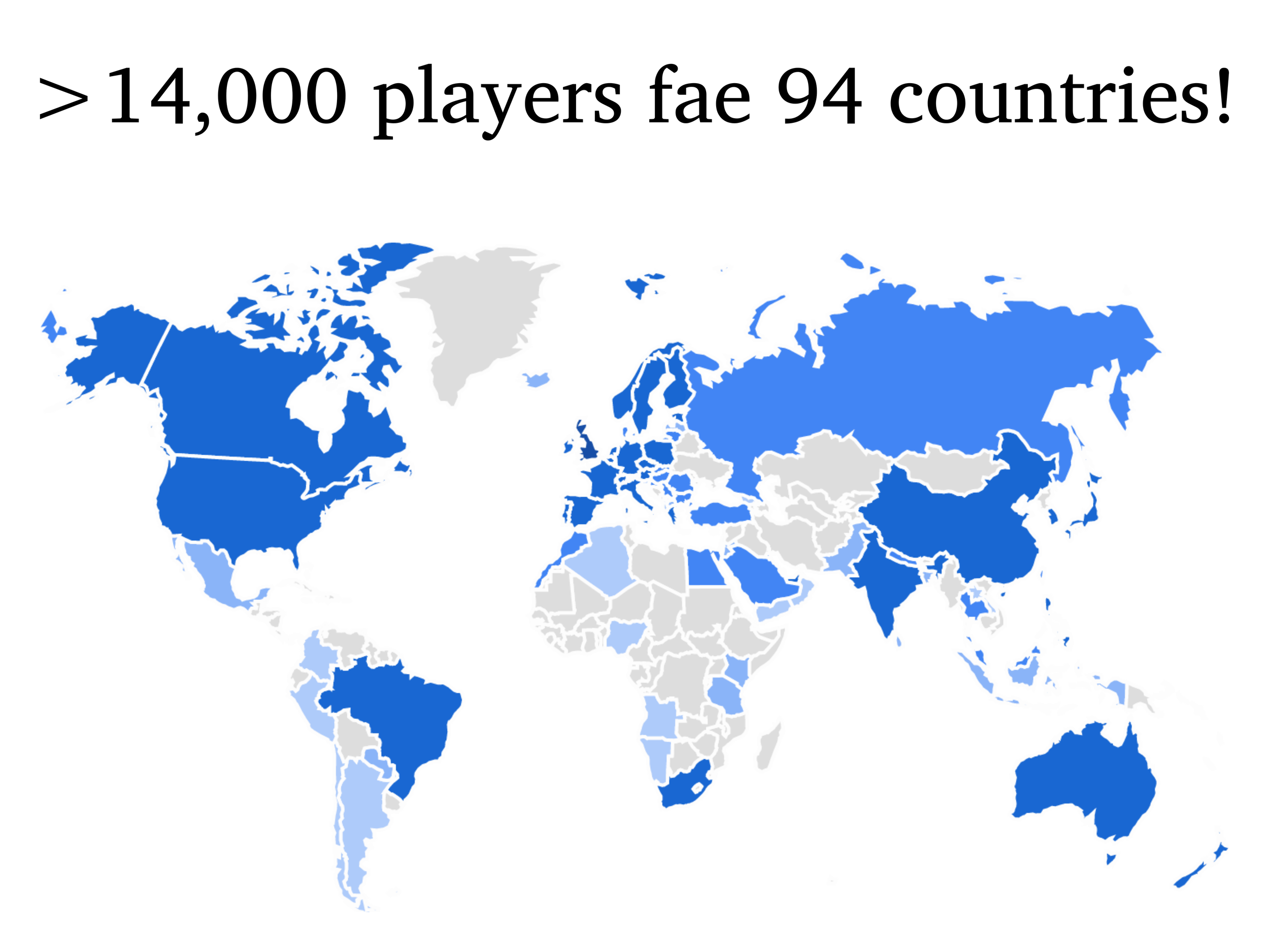Wirdle solutions week 15
W'ir blyde tae announce dat, as o daday, da Shaetlan Wirdle is haed mair as 14,000 players fae 94 countries. Here's da solutions fir dis week! Scroll fir ee wird at a time tae git da richt answer, it's meaneen, an da history o da wird. Last you'll fin da main references at we øse fir da etymologies, an da latest map o players. You'll fin da priciples o wir spelleen system at https://www.iheardee.com/shaetlan/spellin-in-shaetlan
✅
Hit's important tae mind at "Aald English" wis nivver a monolithic language, reider hit's a cover term fir fower distinct Nort Sea Germanic varieties. Da direct ancestor tae Scots wis Northumbrian Aald English. Da direct ancestor tae English wis Mercian Old English. But maist o whit data is left comes fae Wast Saxon Aald English. Wharivver possible w'ir gien da Northumbrian Aald English forms, seein as da main ancestors tae Shaetlan is Norn an Scots (no English), wi a lok o Dutch/Low German influence.
✅
Wir tanks agein tae Julie fir tinkin up da idee, an tae Andrew fir makkin it possible! 🤗
hoose ‘house’
History: Aald Scots haes twartree forms fir dis wird, laek houis(e), ho(u)s(s)(e), hu(s)se, hus(s), hoos(e), etc. Dey come dae da Aald English hūs an an shaas aff yun airlier pronunciation (da Standirt English pronunciation wi a au- diphthong onnly cam laetter). Da wird cam doon fae da Proto-Germanic *hūsą - fokk ergues ower da origin o yun een, but it’s maebbi fae Proto-Indo-European *(s)kewH-s- ‘cover’, a nominal derivation o *(s)kewH- ‘tae cover, hoid’.
banks ‘cliffs on da cosst’, plural o bank ‘aidge’
History: dis is a airly lonn fae Scandinavian intae English an Scots baith. Da Aald Norse bakki ‘bank (o a burn, loch, etc.), ridge, embankment, hill, etc’ can still be fun in Icel., Far. Baki, ‘bank, cliff’ No., Da. bakke, an Sw. backe, ‘hill’. Hit comes fae da Proto-Germanic *bankô ‘bank, embankment; hill’, at in turn comes fae Proto-Indo-European *bhong‑eh2‑ ‘raised surface, bulge’.
baith ‘both’
History: dis wird is pairtly a Aald English compound an pairtly a lonn fae Aald Norse. Aald Scots haes bathe, baith. Da Aald English baðe is a compound o bā þā ‘baith da, both yun’. Hit wis reinforced wi da Aald Norse báðir ‘baith’ (dey can still be fun in Icel., Far. báðir, No., Da., både, Sw. båda ‘both’). Da forms ultimately ging back tae Proto-Germanic *bai ‘baith’ at comes fae Proto-Indo-European *bʰoh₁ ‘both’.
stank ‘ditch whaar watter lies’
History: da Aald Scots stank ‘a ditch, pond’ is attestit fae ca 1400. Hit’s a lonn in baith Scots an English fae Aald French estanc ‘a pool, pond’, at comes fae Latin stāgnum ‘pond, mire, dub; lyin watter’. Whaar it ultimately gings back tae isna kent, but it micht ging back tae Proto-Indo-European *steh₂g- ‘tae seep, dreep’.
pleep ‘tae greet, plüt, mak a wark’
History: dis wird is fir da maist pairt fun only in Orkney an Shetland. Da etymology scoarns da soond o da high, shrill soonds o birds, an parteeklalrly young brids. Seemlar forms is fun firbye in Danish, Swedish an Norwegian laek pipe, an in Ducth an German an aa as piepen.
afore ‘before’
History: da Aald Scots aforne comes fae Aald English onfora. Hit’s a compound o a ‘on’ + fore ‘a front o’, at comes fae Aald English fora, an in turn comes fae da Proto-Germanic *fura(i)- ‘afore, a front o, fir’, at ultimately comes fae da Proto-Indo-European *per- ‘afore, a front o; foremaist’. Da preposition a ‘on’ shaas a aald farrant form o Aald English an ‘on’. Fir mair aboot dis, see wir post fae 17 November 2021.
faels plural o fael ‘poan, turf’
History: da Aald Scots fayle, faill, etc. is attestit fae ca 1420 wi da meaneen ‘turf’ an fae 1513 wi da meaneen ‘a poan’. Da wird is a lonn fae da Scots Gaelic fàl ‘pone, turf’, at comes fae Aald Irish fál ‘fence, heidge, enclosure’ (yun’s also da origin o da Pictish fahel). It ultimately gings back tae da Proto-Indo-European røt *wel- ‘tae turn, winnd, rowl’.
References
Bokmålsordboka. 2022. Språkrådet og Universitetet i Bergen. Available at http://ordbøkene.no.
Christie-Johnston, Alastair & Adaline Christie-Johnston. 2014. Shetland words. A dictionary of the Shetland dialect. Lerwick: The Shetland Times.
de Vaan, Michiel. 2008. Etymological dictionary of Latin and the other Italic languages. Leiden, Boston: Brill
de Vries, Jan. 1977. Altnordisches etymologisches Wörterbuch. Leiden: Brill.
DSL Online. 2002. Glasgow: The University of Glasgow. Available at https://dsl.ac.uk/.
Heggestad, Leiv, Finn Hødnebø & Erik Simensen. 1993. Norrøn ordbok. 4th edn of Gamalnorsk ordbok. Oslo: Det norske samlaget.
Hellquist, Elof. 1993. Svensk etymologisk ordbok. 3rd edn. 2 Vols. Malmö: Gleerups.
Jakobsen, Jakob. 1985 [1928]. An etymological dictionary of the Norn language in Shetland. Lerwick: The Shetland Times.
Kroonen, Guus. 2013. Etymological dictionary of Proto-Germanic. Leiden: Brill.
Lehmann, Winfred P. 1986. A Gothic etymological dictionary. Leiden: Brill.
Macbain, Alexander. 1911. An etymological dictionary of the Gaelic language. Stirling: Eneas Mackay.
Marwick, Hugh. 1929. The Orkney Norn. Oxford: Oxford University Press.
Matasović, Ranko. 2009. Etymological dictionary of Proto-Celtic. Leiden: Brill.
Nielsen, Niels Åge. 1995. Dansk etymologisk ordbog. Ordenes historie. 4th edn. København: Gyldendal.
Nynorskordboka. 2022. Språkrådet og Universitetet i Bergen. Available at http://ordbøkene.no.
OED Online. 2021. Oxford: Oxford University Press. Available at https://www-oed-com.ezproxy.uni-giessen.de.
Orel, Vladimir. 2003. A handbook of Germanic etymology. Leiden: Brill.
Pfeifer, Wolfgang (ed.). 1997. Etymologisches Wörterbuch des Deutschen. München: Deutscher Taschenbuch Verlag.
Pokorny, Julius. 1994. Indogermanisches etymologisches Wörterbuch. 3rd edn. 2 Vols. Tübingen: Francke Verlag.
Torp, Alf. 1919. Nynorsk etymologisk ordbok. Kristiania: Forlaget H. Aschehoug & Co.
Zoëga, Geir T. 1896. English-Icelandic dictionary. Reykjavík: Sigurður Kristjánsson.
Zoëga, Geir T. 1922. Icelandic-English dictionary. 2nd edn, enlarged. Reykjavík: Sigurður Kristjánsson.

